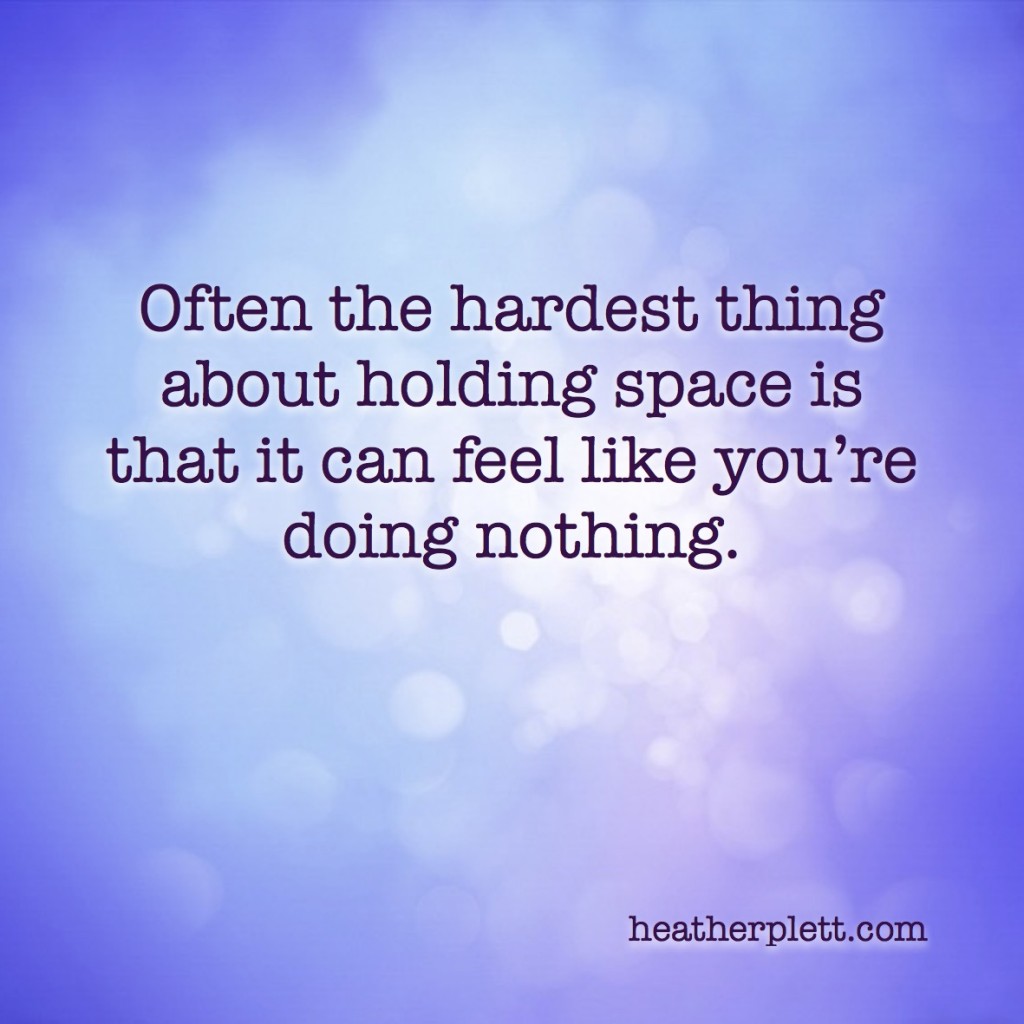Now that it’s September, I’m getting back into the rhythm of writing weekly reflections. This one’s fairly short.
I have a few more thoughts about holding space to share with you…
In the past six months, since my blog post went viral, I’ve done more than half a dozen interviews on the topic of holding space. The nice thing about talking about something so much is that I gain a deeper understanding every time I talk about it. Sometimes I say things I didn’t know I knew!
This week, I was doing an interview for an upcoming podcast, when I heard myself say this…
Sometimes the hardest thing about holding space is it can feel and look a lot like doing nothing.
When we’re holding space well, we’re keeping our ego out of it, not controlling the outcome, not giving unsolicited advice, and not taking people’s power away. That can feel a lot like doing nothing.
We all want to DO SOMETHING. When a friend, family member, student, or client is hurting, confused or overwhelmed, it’s really hard not to step in and fix the situation, offer resources, or give advice. Think about all of the food that people give away when someone is grieving – everyone wants something to do in response to the gaping void this person is feeling. Or think about the last time someone confided in you and your first instinct was to rush in and offer them something that might help.
I see it (and feel it myself) often when I host circles. When someone in the circle is crying, people lean in and really, really want to have something to offer – advice, other ways of framing the story, tissue, SOMETHING. But the practice in the circle is to remain silent and to listen with attention when someone else is holding the talking piece. And the greatest healing I have seen take place in the circle is when people feel genuinely and unconditionally listened to.
It’s true that often there are perfectly valid and practical things to do in response to someone else’s pain. I am eternally grateful for all of the people who brought food, looked after my dad’s farm animals, helped us prepare the farm for sale, etc., after Dad died, for example.
But just as often, people need our presence more than they need our actions or advice.
Giving people our presence can feel a whole lot harder than giving them our advice. It can make us feel vulnerable, useless, and unproductive. And yet, when I think back to the people who were the greatest support during my own difficult times, it was often those people who knew how to show up, listen deeply, withhold judgement, and trust me to know how to find my own path through it that were the most memorable. I remember people who showed up after my son died and simply sat there and held his lifeless body while we cried together. And I remember people who came when my husband was in the hospital who sat on park benches or in vehicles or coffee shops and let me talk or cry or scream. They said little and “did” less, but it was just what I needed.
I find the same thing in my work of hosting retreats and workshops. The ones that are the most successful are usually the ones in which I speak the least. When I give people gentle guidance and a safe container to do their own work, they get much more out of it than when I dump a lot of content on them. (The same can be said for parenting.)
This has been well modelled for me by my mentor, Christina Baldwin. At a recent writing retreat, we had a 24 hour silent, solitary, writing period. “I will be in the kitchen area all day, holding space for you,” said Christina. Ostensibly, she was “doing nothing”, and yet we all felt incredibly supported, knowing that she was there, gently holding us. While we did our deep work, we could trust that she was present for us, even though she never said a word. We also knew that the next day in the circle, she would hold the container while we talked about whatever came up.
The next time you’re inclined to do something in support of someone you care about, pause for a moment and consider what they really need. Is there a practical need you can fill, or would it be best to show up and offer deep listening, trust, and unconditional love?
Interested in more articles like this? Add your name to my email list and you’ll receive a free ebook, A Path to Connection. I send out weekly newsletters and updates on my work.

